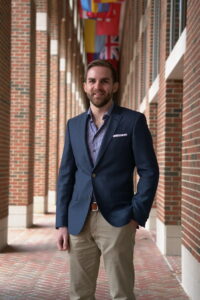News & Stories
On top of the world

The nickname of Gillette, Wyoming – the Energy Capital of the Nation – is no mere slogan. Gillette, population 30,000, sits right in the middle of coal country.
It’s where Greg Dougherty (MBA ’18) grew up.
For decades, about 40% of all coal produced in the U.S. has come from the Powder River Basin of Wyoming and Montana. Much of the area’s economy relies on its energy extraction industry — oil and methane gas in addition to coal — and even though recent economic trends and governmental regulation have cut fossil fuel production, Gillette still electrifies much of the U.S.
“I was always exposed to energy from a young age and developed an appreciation for the importance of it,” says Dougherty. “But I’m also a believer in climate change and realize that addressing it is a huge global challenge.”
Dougherty has risen to that challenge in a unique way. After graduating from UNC Kenan-Flagler Business School’s Full-Time MBA Program, where he concentrated in energy and sustainable enterprise, he worked in corporate sustainability and the field of environmental, social and corporate governance (ESG) for several energy companies before moving into asset management.
He now works for Brookfield Renewable, which is consistently ranked among the world’s most sustainable companies, where he supports ESG initiatives and reporting, and works with portfolio companies to develop their ESG programs.
“I knew I wanted to do something in business that made an impact, but I had no real idea of what that actually meant,” says Dougherty. “That’s why I thought UNC Kenan-Flagler was the perfect opportunity for me. I was going to get a lot of exposure to all of these different facets of business and get a better idea of the role I can play.”

ESG management is complex work, increasingly seen as an essential factor in a company’s healthy bottom line and maintaining positive investor engagement. It’s now a key strategic role as global businesses conform to evolving government regulations and respond to louder investor calls for environmental and social responsibility.
Dougherty evaluates companies’ approaches to environmental and social sustainability, such as their processes for tracking and reducing greenhouse gas emissions, and focuses on identifying ESG-related risks associated with potential investments. However, his work is not just identifying risks and regulatory gaps, but also identifying potential opportunities for companies to improve their performance and implement impactful programs.
ESG is fueled by massive amounts of data and the personal drive of professionals like Dougherty.
“If it’s something that you or the company really don’t believe in, it’s really hard to convince other people,” he says. “If you can show that you’re doing things like reducing emissions or you’re committed to diversity, you have a lower risk profile. You are showing investors that you are operating well in multiple senses of the word.
“You can make a nice, glossy sustainability report that says a lot of nice things, but when it comes down to it you have to show not just a commitment to change but that you are acting on that commitment.”
Dougherty’s commitment to change took shape after he joined the U.S. Navy right after high school. During two of his three deployments over six years, he conducted anti-piracy operations off the Horn of Africa near Djibouti and Somalia. He was struck by the systemic poverty he saw and how long histories of economic and government failures had caused it.
“I started thinking about the role the private sector can play in economic development and improving livelihoods globally,” says Dougherty. “When I got out of the military, I was looking through a lens of doing something that would make a real difference. That’s what drove me the most.”
A first-generation college student, Dougherty began his path through higher education by taking classes at Tidewater Community College in Norfolk, Virginia. While working as a contractor developing operating and safety procedures for the Navy, he earned an associate’s degree in business and then transferred to the University of Virginia where he earned a bachelor’s in international relations.
UNC Kenan-Flagler’s energy and sustainable enterprise concentrations were major draws when Dougherty explored MBA programs. Many other schools he applied to offered only a few energy and sustainability classes, so Dougherty was blown away by the sheer number of energy classes and the depth of topics offered by the MBA Program and its Energy Center.
Professionals working in the renewables development industry taught classes on renewables development, and Duke Energy executives came to campus to discuss the power industry.
“Getting those unique insights helped me understand not just what energy companies do but the current challenges based on their real-world experience,” he says. “That was extremely valuable and always will be.”
Dougherty felt like he belonged at UNC Kenan-Flagler. He was active in the MBA Energy Club and Veterans Association, volunteered to teach elementary school children about basic business principles as part of the MBA Student Association and led local toy and food drives. In 2018, Poets & Quants named Dougherty one of the top 100 MBAs to watch and he received a UNC Kenan-Flagler Core Value Award for his community service work.
“I knew I wanted to do something in business that made an impact, but I had no real idea of what that actually meant,” says Dougherty. “That’s why I thought UNC Kenan-Flagler was the perfect opportunity for me.”
He remains active on campus, returning regularly to judge case competitions or speak on career panels and at conferences run by the Ackerman Center for Excellence in Sustainability and the MBA Net Impact Club.
“When I got to Carolina, everything just clicked. It felt right,” he says. “Just walking through the hallways, I felt the sense of community right off the bat. Now I love talking to students about energy or sustainability and what it’s like working in the industry. That’s been a highlight of my experience, just being able to talk with students who are trying to make the same decisions and are in the same place I was not too long ago.”
It’s the place where Dougherty found the career path he always wanted — one that’s meaningful now and will only become more meaningful in the future.
“I’d rather play a small role in something big as opposed to a big role in something small,” he says. “And that’s been my career so far. I’ve been doing really interesting work, but it does feel like in the big picture it will be much more than that.”